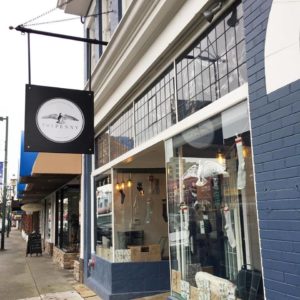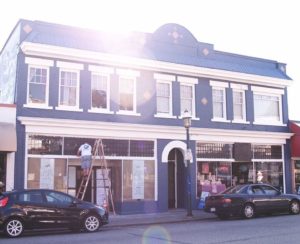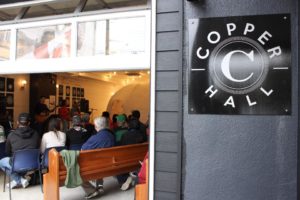 Mission, BC has a new “coffee home,” a vibrant blue building housing The Penny coffee shop upstairs, and The Copper Hall community hall downstairs. What most of the people here enjoying the warm glow of incandescent light bulbs, buckwheat waffles and locally roasted espresso don’t realize is that this building is also the new home of New Heights church, and the friendly barista who made their latte is its pastor, Greg Elford. It has been quite a journey, from being a safe, comfortable church uptown, to being a church that built and manages a coffee shop, and worships in the community hall on the lower level, downtown in the centre of their community.
Mission, BC has a new “coffee home,” a vibrant blue building housing The Penny coffee shop upstairs, and The Copper Hall community hall downstairs. What most of the people here enjoying the warm glow of incandescent light bulbs, buckwheat waffles and locally roasted espresso don’t realize is that this building is also the new home of New Heights church, and the friendly barista who made their latte is its pastor, Greg Elford. It has been quite a journey, from being a safe, comfortable church uptown, to being a church that built and manages a coffee shop, and worships in the community hall on the lower level, downtown in the centre of their community.
Facing the reality of decline. In 2014 New Heights church was meeting in a theatre uptown for their worship gathering, and running ‘Hope Central’ soup kitchen downtown, organizing volunteers across the city to provide meals 6 days a week. Greg reflects that they had thought that this community work might get people to come to them. However, it became clear that the marginalized people they were connecting with downtown would not be willing or able to find their way to their church gathering uptown. New Heights church was feeling increasingly safe and apathetic, and this troubled Greg and his wife Erin. There had been a need for a season of recovery and healing, but it seemed like this time had lasted “a little too long.” Their church was no longer engaging young people in conversation, and Millenials were disappearing. Those who had once been young leaders were 20 years older and hadn’t been replaced by new young people coming in. This pastoral couple reached the conclusion that, “We’d rather do some stuff that matters to us and could get us fired than die a slow, painful, apathetic death as a church.”
Let’s talk about that—LifePlan. They opened that conversation up wide with New Heights by going through the LifePlan process. This time of conversation and prayer clarified the priorities that would guide all their future decisions. New Heights asked the question together: what would it look like for us to become incarnational and move our community downtown, and become a catalyst in our city? They were renting two spaces—one for their worship gathering and one for their community soup kitchen—and began to explore the alternative: buying a downtown space to house them both.
 There was a building for sale right smack in the middle of main street, but New Heights had no savings to make the purchase. They decided, since the building brought in income every year through the rental of it’s retail spaces, they would take a risk and get a loan. However, there was a city by-law against churches owning a building downtown, so some savvy legal maneuvering was required. On the advice of local lawyers and businessmen, New Heights incorporated and started a foundation called ‘Celebrate.’ With the help of the Free Methodist denomination and local connections this foundation got a mortgage for the building with the intention of “giving it back to the city” in some way.
There was a building for sale right smack in the middle of main street, but New Heights had no savings to make the purchase. They decided, since the building brought in income every year through the rental of it’s retail spaces, they would take a risk and get a loan. However, there was a city by-law against churches owning a building downtown, so some savvy legal maneuvering was required. On the advice of local lawyers and businessmen, New Heights incorporated and started a foundation called ‘Celebrate.’ With the help of the Free Methodist denomination and local connections this foundation got a mortgage for the building with the intention of “giving it back to the city” in some way.
What about a coffee shop? There were bumps along the way as they worked on the renovation and made plans to move. Greg vividly remembers the day the mayor of Mission called to yell at him because he heard rumors that New Heights church was moving into a building on main street. He was very concerned that the people from the soup kitchen downstairs were going to spill onto the main street upstairs. At this time, the idea of what they would do with the main street retail space had not evolved. Greg went in person with one of his Board members to meet the mayor in response to this call. They assured him, “We’re happy to pay tax, and we hate that too (that churches are only open on Sundays). We think church buildings should be used by the community every waking hour—so how about we call it a community hall?”
The mayor calmed down and they spent the next hour sitting together and talking. He told them, “You really need a legitimate business, not some hokey excuse for a business.” It just so happened that the day before Greg had bought the equipment from a Starbucks going out of business, so he said “What about a coffee shop? We bought one yesterday.” The mayor’s demeanor completely changed. “Perfect, we desperately need a coffee shop downtown!” The conversation ended with hugs and sincere best wishes. This was just one more confirmation in Greg’s mind that God had orchestrated these events.
 It’s okay if you hate this idea. New Heights new home has three levels: 5 apartments on top, 2 retail spaces opening onto the main street—one which houses The Penny—and a community hall they have named Copper Hall on the lower level. The purchase of this building was just the beginning of a lengthy reno project and move which had a significant impact on the church congregation. Greg led them through a sermon series that articulated a clear vision and essentially gave people permission not to like this idea and find a church somewhere else. Greg and his leadership team realized that, while they were sure this was the direction God was leading them, some in their church wouldn’t want to be part of it and they wanted to bless and release these people in a way that was kind but unequivocal. A dozen families left New Heights before they made the move. For a church with around 100 people attending on a Sunday this loss was significant. But the reality of the new focus that had emerged through the LifePlan process had to be faced. Greg says frankly,
It’s okay if you hate this idea. New Heights new home has three levels: 5 apartments on top, 2 retail spaces opening onto the main street—one which houses The Penny—and a community hall they have named Copper Hall on the lower level. The purchase of this building was just the beginning of a lengthy reno project and move which had a significant impact on the church congregation. Greg led them through a sermon series that articulated a clear vision and essentially gave people permission not to like this idea and find a church somewhere else. Greg and his leadership team realized that, while they were sure this was the direction God was leading them, some in their church wouldn’t want to be part of it and they wanted to bless and release these people in a way that was kind but unequivocal. A dozen families left New Heights before they made the move. For a church with around 100 people attending on a Sunday this loss was significant. But the reality of the new focus that had emerged through the LifePlan process had to be faced. Greg says frankly,
“If we want to reach different folks, or have conversation with different people, and we aren’t willing to do things differently, how is that going to happen?”
 The new New Heights, bursting at the seams. On the other side of the move it is easier to see God’s hand in each turn of events. In October 2017, New Heights held their first service in Copper Hall, and The Penny coffee home opened to a great deal of positive buzz about their social enterprise. In the first ten weeks New Heights has already outgrown the Copper Hall space and they are having to talk about a second service. Along with the core New Heights congregation, who fundraised and labored for years on this reno project, their new congregation includes 19 and 20 year olds connected with Young Life, a Christian youth organization that uses The Penny for it’s gathering on Monday for free. There are also families who were ‘Done’ with church and are intrigued enough to give it another try. There are marginalized people from their soup kitchen ministry, some with addictions or mental illnesses. There are people with disabilities and their service providers. There are students from the local Bible college who are excited to do their ministry internships at The Penny. The style of their worship gathering is informal and conversational, and Greg is regularly interrupted by questions or interjections from some of the less inhibited folks. He’s not bothered by this; in fact there’s one person in particular who he now has in mind as he prepares for Sunday—he knows if he can communicate in a way that reaches this person’s unique needs he’s hitting the mark in this new chapter of New Heights ministry.
The new New Heights, bursting at the seams. On the other side of the move it is easier to see God’s hand in each turn of events. In October 2017, New Heights held their first service in Copper Hall, and The Penny coffee home opened to a great deal of positive buzz about their social enterprise. In the first ten weeks New Heights has already outgrown the Copper Hall space and they are having to talk about a second service. Along with the core New Heights congregation, who fundraised and labored for years on this reno project, their new congregation includes 19 and 20 year olds connected with Young Life, a Christian youth organization that uses The Penny for it’s gathering on Monday for free. There are also families who were ‘Done’ with church and are intrigued enough to give it another try. There are marginalized people from their soup kitchen ministry, some with addictions or mental illnesses. There are people with disabilities and their service providers. There are students from the local Bible college who are excited to do their ministry internships at The Penny. The style of their worship gathering is informal and conversational, and Greg is regularly interrupted by questions or interjections from some of the less inhibited folks. He’s not bothered by this; in fact there’s one person in particular who he now has in mind as he prepares for Sunday—he knows if he can communicate in a way that reaches this person’s unique needs he’s hitting the mark in this new chapter of New Heights ministry.
 The Penny as missional community. As far as the New Heights church is concerned The Penny is more than a social enterprise: it is a missional community. The Penny makes space for a natural gathering of hundreds of Millenials, plus the 12 young staff who work alongside Pastor Greg and regularly encounter other members of New Heights church dropping in for a visit throughout the week. Greg says, “It’s a place that’s widening our pool of relationships, and our friendships with the people we meet there is where ministry starts.”
The Penny as missional community. As far as the New Heights church is concerned The Penny is more than a social enterprise: it is a missional community. The Penny makes space for a natural gathering of hundreds of Millenials, plus the 12 young staff who work alongside Pastor Greg and regularly encounter other members of New Heights church dropping in for a visit throughout the week. Greg says, “It’s a place that’s widening our pool of relationships, and our friendships with the people we meet there is where ministry starts.”
Spending six days a week in this “coffee home” has transformed the way Greg does pastoral ministry. “I have way more 10-minute connections with people everyday instead of like a 1-hour connection once every three months. It’s shifted my role—I’m making people lattes but I’m also networking with people from all across the city. ‘Hope Central’ is usually the first conversation they want to have because they want to get involved in poverty alleviation strategy. But sometimes there’s opportunity to talk about New Heights, to tell the story of a church that decided, rather than building a building for themselves, to buy one and gave it back to the city, and then rent it from themselves.” That’s the point in the conversation when Greg says people usually do a double-take. New Heights is changing the perception of what a church is as they are intentionally on mission in the city of Mission.
Sound intriguing? New Heights is looking for an ‘administrative equipper’ – contact Pastor Greg ([email protected]) for more information. You can read more about The Penny/Copper Hall/Hope Central, on their website here. If you’re feeling a call to step out into a new kingdom venture yourself you can contact Jared Siebert (jared.siebert

